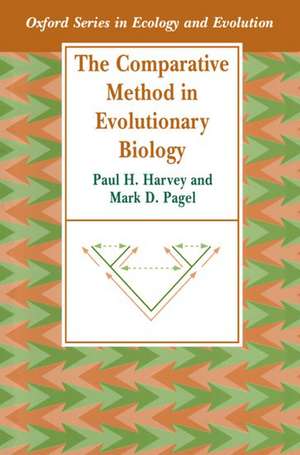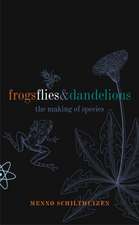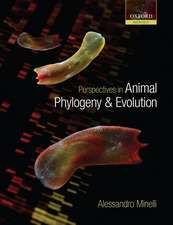The Comparative Method in Evolutionary Biology: Oxford Series in Ecology and Evolution
Paul H. Harvey, Mark D. Pagelen Limba Engleză Paperback – 18 apr 1991
Din seria Oxford Series in Ecology and Evolution
-
 Preț: 321.54 lei
Preț: 321.54 lei - 25%
 Preț: 502.27 lei
Preț: 502.27 lei - 14%
 Preț: 353.15 lei
Preț: 353.15 lei -
 Preț: 325.98 lei
Preț: 325.98 lei - 18%
 Preț: 459.19 lei
Preț: 459.19 lei - 28%
 Preț: 375.55 lei
Preț: 375.55 lei - 19%
 Preț: 439.25 lei
Preț: 439.25 lei - 13%
 Preț: 443.22 lei
Preț: 443.22 lei - 28%
 Preț: 376.06 lei
Preț: 376.06 lei - 34%
 Preț: 697.21 lei
Preț: 697.21 lei - 9%
 Preț: 296.35 lei
Preț: 296.35 lei - 14%
 Preț: 480.86 lei
Preț: 480.86 lei - 12%
 Preț: 424.74 lei
Preț: 424.74 lei - 18%
 Preț: 356.03 lei
Preț: 356.03 lei - 13%
 Preț: 443.36 lei
Preț: 443.36 lei - 13%
 Preț: 464.12 lei
Preț: 464.12 lei - 27%
 Preț: 377.84 lei
Preț: 377.84 lei - 41%
 Preț: 139.55 lei
Preț: 139.55 lei - 30%
 Preț: 718.17 lei
Preț: 718.17 lei - 38%
 Preț: 268.41 lei
Preț: 268.41 lei - 30%
 Preț: 590.27 lei
Preț: 590.27 lei - 30%
 Preț: 497.74 lei
Preț: 497.74 lei - 19%
 Preț: 351.87 lei
Preț: 351.87 lei - 18%
 Preț: 360.28 lei
Preț: 360.28 lei - 28%
 Preț: 375.73 lei
Preț: 375.73 lei - 34%
 Preț: 802.62 lei
Preț: 802.62 lei - 19%
 Preț: 351.62 lei
Preț: 351.62 lei - 14%
 Preț: 437.87 lei
Preț: 437.87 lei - 30%
 Preț: 550.67 lei
Preț: 550.67 lei - 22%
 Preț: 400.41 lei
Preț: 400.41 lei - 19%
 Preț: 352.29 lei
Preț: 352.29 lei - 18%
 Preț: 354.05 lei
Preț: 354.05 lei - 28%
 Preț: 373.46 lei
Preț: 373.46 lei - 28%
 Preț: 495.10 lei
Preț: 495.10 lei - 8%
 Preț: 299.19 lei
Preț: 299.19 lei - 23%
 Preț: 464.29 lei
Preț: 464.29 lei - 28%
 Preț: 375.06 lei
Preț: 375.06 lei - 30%
 Preț: 592.43 lei
Preț: 592.43 lei
Preț: 375.06 lei
Preț vechi: 518.14 lei
-28% Nou
Puncte Express: 563
Preț estimativ în valută:
71.78€ • 77.94$ • 60.29£
71.78€ • 77.94$ • 60.29£
Carte tipărită la comandă
Livrare economică 11-17 aprilie
Preluare comenzi: 021 569.72.76
Specificații
ISBN-13: 9780198546405
ISBN-10: 0198546408
Pagini: 248
Ilustrații: figures, tables
Dimensiuni: 155 x 234 x 15 mm
Greutate: 0.4 kg
Ediția:New.
Editura: OUP OXFORD
Colecția OUP Oxford
Seria Oxford Series in Ecology and Evolution
Locul publicării:Oxford, United Kingdom
ISBN-10: 0198546408
Pagini: 248
Ilustrații: figures, tables
Dimensiuni: 155 x 234 x 15 mm
Greutate: 0.4 kg
Ediția:New.
Editura: OUP OXFORD
Colecția OUP Oxford
Seria Oxford Series in Ecology and Evolution
Locul publicării:Oxford, United Kingdom
Cuprins
The comparative method for studying adaptation; Why worry about phylogeny?; Reconstructing phylogenetic trees and ancestral character states; Comparative analysis of discrete data; Comparative analysis of continuous variables; Determining the form of comparative relationships; Conclusion; References; Author index; Subject index.
Recenzii
'Harvey and Pagel's compelling survey of the powerful analytical techniques currently available for the study of adaptation in a phylogenetic context provides the basis for new and deeper insights into the origin of and maintenance of organic diversity.'Science, Vol. 254, 1991















